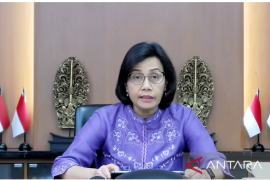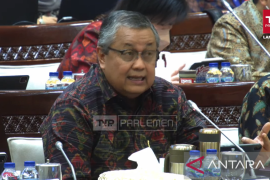"In facing the macroeconomic condition in 2016, the state budget deficit remained under control, at a safe level of 2.46 percent of the GDP," the minister noted.Jakarta (ANTARA News) - Indonesias temporary deficit in the revised 2016 state budget had reached Rp307.7 trillion, accounting for 2.46 percent of the national gross domestic product (GDP), Finance Minister Sri Mulyani Indrawati stated.
"In facing the macroeconomic condition in 2016, the state budget deficit remained under control, at a safe level of 2.46 percent of the GDP," she noted at a press conference here on Tuesday.
The temporary budget deficit is higher than the target of 2.35 percent set in the revised 2016 state budget, she pointed out.
"With the realized temporary deficit of Rp307.7 trillion and the realized temporary budget financing of Rp330.3 trillion, the leftover budget funds had reached Rp22.7 trillion in realizing the revised 2016 state budget," the minister remarked.
The realized temporary budget deficit was derived from state revenues, which reached Rp1,551.7 trillion at the end of 2016, or 86.9 percent of the state expenditure target of Rp1,859.4 trillion, or 89.3 percent of the target, she revealed.
On the revenue side, tax receipts touched Rp1,283.5 trillion, or 83.4 percent of the target, while non-tax state revenues reached Rp262.3 trillion, or 107 percent of the target, she explained.
"In 2016, tax receipts grew 4.2 percent. However, the growth was Rp33 trillion lower than the previous shortfall outlook of Rp219 trillion. The customs and excise receipts fell by a nominal value nationwide due to a shortfall in cigarette production," the minister said.
Indrawati clarified that the tax receipts until the end of last year were also fueled by the successful tax amnesty program in which the government had managed to meet its target of up to Rp107 trillion in repatriated assets at the end of the second stage of its program.
"If the tax amnesty program was not incorporated to the tax receipts, the tax growth in the non-oil/non-gas sector would be minus 4.9 percent due to the economic slowdown, low commodity prices, tax incentives through a change in the amount of non-taxed income, and tax reforms," she stated.(*)
Editor: Heru Purwanto
Copyright © ANTARA 2017











